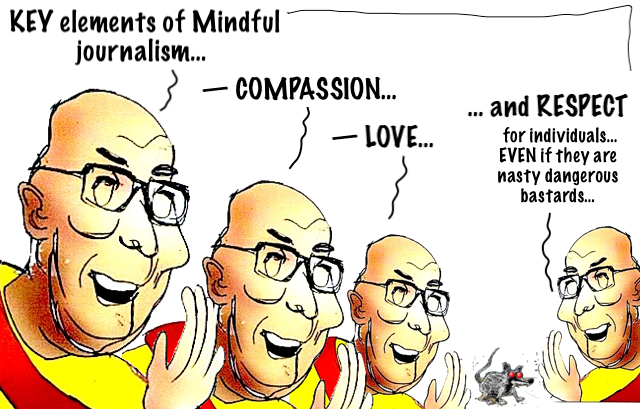Search
Democracy Links
Member's Off-site Blogs
mindful media — buddhism to the rescue of journalism.....

The term “mindful communication” sparked the most heated discussion. If I understood the forum’s organizers correctly, they define “mindful communication” as an ethical approach to media reporting that prioritizes compassion, love, and respect for individuals as the key elements of journalism. In other words, it’s about applying Buddhist principles to traditional journalism and blogging.
Today, when many countries are involved in war and each nation answers the eternal questions “Who is to blame?” and “What should be done?” in its own way, Hindus and Buddhists offer an alternative path to resolving conflicts. The experts who gathered at the conference in New Delhi believe this approach can be embraced by everyone, not just Buddhists and Hindus. The principles of ‘Dharma’ and ‘Dhamma’ could significantly influence modern media practices, which currently focus more on sensationalism or manipulation than on individuals and their problems.
In other words, the pursuit of sensational stories needs to retreat into the background. Of course, this is easier said than done. To do so, we need to fundamentally transform the entire media system, reevaluate its economic policies, and adjust its tools and engagement with public consciousness. It’s a tall order. However, Buddhists are in no rush. India, which positions itself as a fitting platform for these changes, boasts great human resources, financial capabilities, and religious potential – and so, anything is possible.
Buddha teaches us to be mindful of our language
“The Buddhist perspective on media and communication places great importance on speech, which is part of the Noble Eightfold Path [the path laid out by the Buddha that leads to the cessation of suffering and liberation from ‘samsara’]. This principle encourages people to speak and write the truth while opposing lies, rudeness, slander, and idle chatter,” says Benny Liow, editor of the popular Malaysian magazine Eastern Horizon.
“It essentially calls on all people, including journalists and media professionals, to be mindful of their language. The spread of fake news certainly contradicts Buddhist teachings, as it violates the Fourth Precept – refraining from lying."
Journalists should adhere to the following guidelines: When something is true, beneficial, but disagreeable to others, the Buddha waits for the proper time to say it. When something is true, helpful, and pleasant, the Buddha always says it.”
From hype to empathyThe forum’s aim was to highlight Buddhist and Hindu principles such as mindfulness and compassion, which media professionals should base their work on. These principles can guide those who work with social media and in traditional journalism, paving the way for ethical reporting and the creation of positive, constructive content.
“This forum is incredibly important. We need to end conflicts in the multipolar world. No civilization can tackle these challenges alone. It requires a collective effort and a shared search for solutions,” said Atul Aneja, an Indian journalist and adviser at the Asia Vision Institute.
“The Buddhist approach, which can be adopted by the countries in our region, offers pathways for resolving and avoiding conflicts—whether it’s in Ukraine, Palestine, or elsewhere. We need to build a new, multipolar world—a post-Covid world. It’s time to change the old rules which won’t work in this new world. I believe this conference is part of that process.”
In conclusionOne of the forum’s key practical objectives was to connect journalists, bloggers, and scholars from different countries. It aimed to foster friendships, encourage long-term collaboration, and facilitate the sharing of experiences, particularly in the fields of content creation and distribution. From this perspective, the event was highly beneficial. Given the current scale of global conflicts, it was incredibly important for journalists to communicate with foreign colleagues.
At the same time, it remains unclear how to effectively stop wars, interfaith strife, and territorial disputes through Buddhist teachings in those regions where Buddhists are a minority, and where there is a clash of different ideologies and existential contradictions – whether it is the Russia-Ukraine conflict or the war in Gaza.
https://www.rt.com/india/604241-buddhists-want-change-journalism/
YOURDEMOCRACY.NET RECORDS HISTORY AS IT SHOULD BE — NOT AS THE WESTERN MEDIA WRONGLY REPORTS IT.
- By Gus Leonisky at 20 Sep 2024 - 5:00am
- Gus Leonisky's blog
- Login or register to post comments
Recent comments
1 hour 39 min ago
1 hour 47 min ago
2 hours 23 min ago
3 hours 56 min ago
8 hours 16 min ago
8 hours 22 min ago
8 hours 34 min ago
8 hours 53 min ago
8 hours 59 min ago
12 hours 7 min ago